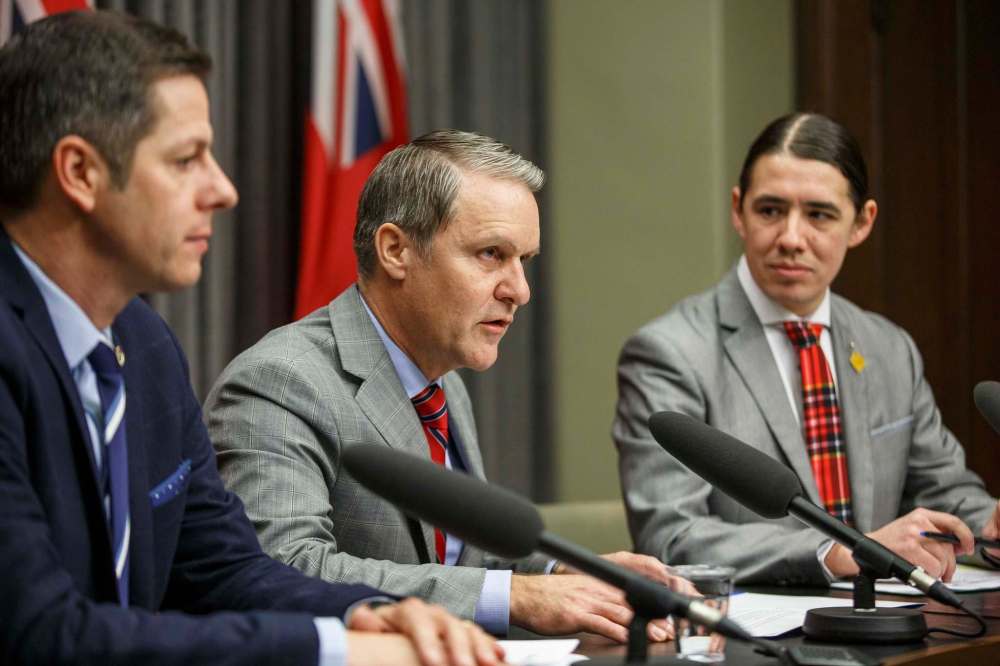City, province, Ottawa strike task force to battle meth
Advertisement
Read this article for free:
or
Already have an account? Log in here »
To continue reading, please subscribe:
Monthly Digital Subscription
$0 for the first 4 weeks*
- Enjoy unlimited reading on winnipegfreepress.com
- Read the E-Edition, our digital replica newspaper
- Access News Break, our award-winning app
- Play interactive puzzles
*No charge for 4 weeks then price increases to the regular rate of $19.00 plus GST every four weeks. Offer available to new and qualified returning subscribers only. Cancel any time.
Monthly Digital Subscription
$4.75/week*
- Enjoy unlimited reading on winnipegfreepress.com
- Read the E-Edition, our digital replica newspaper
- Access News Break, our award-winning app
- Play interactive puzzles
*Billed as $19 plus GST every four weeks. Cancel any time.
To continue reading, please subscribe:
Add Free Press access to your Brandon Sun subscription for only an additional
$1 for the first 4 weeks*
*Your next subscription payment will increase by $1.00 and you will be charged $16.99 plus GST for four weeks. After four weeks, your payment will increase to $23.99 plus GST every four weeks.
Read unlimited articles for free today:
or
Already have an account? Log in here »
Hey there, time traveller!
This article was published 18/12/2018 (2549 days ago), so information in it may no longer be current.
The city, province and federal governments are teaming up to create a tri-level task force that will fight distribution of illicit drugs and address the root causes of the province’s meth crisis.
“As far as we know, this is the first collaborative initiative like this in the country and it’s something that I’m very proud to be a part of,” said Winnipeg Mayor Brian Bowman, who had been calling for such a task force (with unanimous council support) since September.
In interviews last week, officials from the three levels of government told the Free Press they hadn’t yet met in the same room to discuss the surge in meth-related problems.

By Tuesday, it seems they managed to clear their schedules.
“What today signals is a tremendous willingness to collaborate, to work together. No one has cornered the market on good ideas to address the sudden and alarming rise of methamphetamines in our community,” said Manitoba Health Minister Cameron Friesen.
“We know the destruction (meth) causes in families and individuals’ lives. We’re sitting here because we’re saying we want to work together.”
Robert-Falcon Ouellette, MP for Winnipeg Centre, said he and his staff see people who are under the influence of drugs or alcohol in his constituency every day. He wants the task force ought to address the underlying consequences of meth use in the community, such as poverty, homelessness and lack of mental health supports.
“It’s fairly easy to demonize people who use meth, but I see the effects of it every time I step outside of my office,” Falcon-Ouellette said.
“We see boarded-up houses in the area now and I have seen a noticeable change (since) the summer. In my conversations with police officers, this has been an ongoing issue for a number of years and it has been something that has been building over a very long period of time.”
Asked what took so long for all three levels of government to make a joint announcement, Falcon-Ouellette said each level has been working on action plans behind the scenes.
Bowman countered that every other jurisdiction in the country should look to take Winnipeg and Manitoba’s lead.
“I’m hoping that we’ll be able to provide some leadership nationally in terms of how governments can work together and I think we’ll be able to get some good things done together,” the mayor said.
“I don’t expect unanimity in all three levels of governments’ approaches to complex issues like this, but what we are looking for is greater opportunities where we can recognize where we are in agreement and help amplify the effectiveness of each others’ efforts and resources.”
The task force will be co-chaired by Karen Herd, deputy minister of Manitoba Health, Seniors and Active Living, and Michael Jack, the city’s chief corporate services officer.
The group has about six months to recruit members, compile recommendations and produce its first public report, slated for June 2019.

The committee’s goals include identifying possible improvements to existing prevention and treatment programs, looking at ways to improve law enforcement procedures and exploring possible changes to the Criminal Code. They will seek expert advice from people working in health care, justice, policing and academia, as well as those with lived experiences.
Manitoba NDP leader Wab Kinew said the task force creates the illusion of governments taking action.
“While this task force gets launched and does more consultations, more reporting, more research, a lot more Manitobans are going to struggle with addictions, a lot more people are going to get sick and potentially people are also going to feel the spin-off effects, like crime,” Kinew said.
“So we’re past the point of examining the issue. We’re now at the point where there needs to be leadership to tackle the issue directly with things like treatment, harm-reduction initiatives and a safe-injection site.”
Public education and prevention programs that discourage people from using meth should be a top priority, but don’t seem to be on the province’s agenda, Manitoba Liberal Party leader Dougald Lamont said.
“I’ve spoken with public health nurses who say that we’re not getting out into schools where we could be doing it. And the province still isn’t doing enough to contain this or get out ahead in front of it,” Lamont said. “That’s what needs to be done and that’s where resources need to be placed.”
jessica.botelho@freepress.mb.ca
Twitter: @_jessbu
wfpvideo:Ic8hIFYr:wfpvideoHistory
Updated on Tuesday, December 18, 2018 12:19 PM CST: fixes typo
Updated on Tuesday, December 18, 2018 1:44 PM CST: adds video
Updated on Tuesday, December 18, 2018 5:12 PM CST: Full write through, adds fact box




